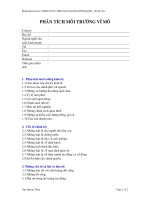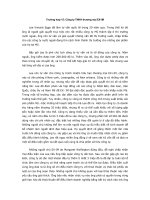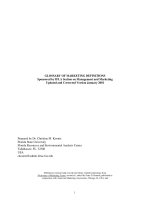Updated im c4 avsvsvavas
Bạn đang xem bản rút gọn của tài liệu. Xem và tải ngay bản đầy đủ của tài liệu tại đây (11.6 MB, 31 trang )
CHAPTER 4
MARKET ENTRY
STRATEGIES
VTHN
1. Entry as a channel decision
CONTENTS
2. Importance of the entry decision
3. Entry strategies
4. Factors influencing choice of entry mode
5. Selecting the entry mode
INTRODUCTION
•
•
•
•
•
Key strategic issue
First stage of channel decision
Channels between nations
Initial or continuing entry
Determines degree of control over mix
“An international market entry mode is an institutional arrangement
necessary for the entry of the company’s products, technology, and
human and financial capital into a foreign country/market.”
(Albaum, Duerr & Strandskov, International marketing and Export Management, 2011)
1 CHANNEL STRUCTURE
A company’s interna0onal marke0ng channel is the path in the structure of
distribu0on through which the products of the company reach the final consumer or
user (marke0ng channels in foreign countries)
The structure of distribu0on for reaching any foreign market includes: intermediary
marke0ng agencies or ins0tu0ons
2 IMPORTANCE OF THE ENTRY DECISION
-
Critical decision
-
Influences final price
-
Inappropriate entry mode = failure
-
Creates barrier to entry for competitors
-
Help minimise risk
2 THE WHOLE CHANNEL CONCEPT
1. the headquarters’ organization developed by the manufacturer to implement its
international marketing operations
2. the methods used or channels through which the products are sent to foreign
markets – the channels between nations
3. the means by which these products reach the target, final user or consumer in the
foreign markets, assuming that the importers are not the final users or consumers –
the channels within nations
3.1 THE ELEMENTS OF ENTRY STRATEGY
● the objectives and goals in the target market;
● needed policies and resource allocations;
● the choice of entry modes to penetrate the market;
● the control system to monitor performance in the market;
● a time schedule.
3.2 ALTERNATIVE MARKET ENTRY MODES
3.2 ALTERNATIVE MARKET ENTRY MODES
Channel between na
Export
Indirect Export (via agents,
trading co.)
Cooperative Export
(Piggybacking)
Direct Export (Overseas
distributor/agent, overseas
sales subsidiary/staff)
Contractual
Licensing/Franchising
Foreign contract
manufacturing
Joint venture
Wholly - owned
subsidiaries
Acquisition
Organic Growth
EXPORT
• Lowest level of commitment
• Different expor4ng op4ons
• Manufacture in one country, sold in another
• O>en first mode of entry used
• Many mul4na4onals s4ll export
Piggybacking “when a company sells its products abroad using another
company’s distribution facilities”
A model of antecedents and drivers of export
marketing strategy
Indirect & Direct export consumer goods
What is the difference between direct
and indirect channels of distribution?
Direct & Indirect exporting
EXPORT
3.2 ALTERNATIVE MARKET ENTRY MODES
Licensing
●
●
Arrangement where licensor allows
licensee to use patent rights,
trademarks, copyrights or know-how on
products or processes
Payment as licensing fee and/or
royalties
●
Greater role than contract manufacturer
●
May supply components
Franchising
●
Different types e.g. business format
(retailers), manufacturer–wholesaler
(Coca Cola)
●
Franchisee fee + royalties
●
Supply components or products
●
Independent franchisee
3.2 ALTERNATIVE MARKET ENTRY MODES
Contract manufacturing
●
Manufacturing by proxy
●
Firm’s product manufactured in the foreign market by another producer
●
Only covers manufacturing not marke=ng
●
May supply components/parts/raw materials
●
Examples – pharmaceu=cals, electronics, cigareCes, clothing
3.2 ALTERNATIVE MARKET ENTRY MODES
3.2 ALTERNATIVE MARKET ENTRY MODES
Joint Venture
• Two or more companies forming a separate company in which all partners have
equity and management voice
• Variable equity share
• Not all partners provide finance, could be factory, labour etc.
• Many governments insist on JVs for entry into market
• Examples:
“Regional joint ventures have proven to be an effective way to combine Nokia's global
technology leadership with strong local partners to accomplish faster and higher
market penetration in new and emerging markets” Nokia
3.2 ALTERNATIVE MARKET ENTRY MODES
“I learned a lot, I hope they learned a lot too, about how important it is for a local
partner to take the lead in the marke9ng area.”
President, True (TelecomAsia mobile brand following split with Orange)
3.2 ALTERNATIVE MARKET ENTRY MODES
Wholly - Owned Subsidiaries
Acquisition
•
Acquisition of a going concern
•
Part-share or 100%
•
May be regulated e.g. Competition Commission
•
High cost option
•
Examples:
“DHL acquired too much and was unable to digest the business cultures properly.”
(International Freight Weekly, 2007)
3.2 ALTERNATIVE MARKET ENTRY MODES
Wholly - Owned Subsidiaries
Organic Growth
Build company without help of partner
100% ownership, high cost
High level of commitment
Level of experience important
Maybe equity regulations
Examples Hyundai, Tesco
3.2 ALTERNATIVE MARKET ENTRY MODES
“We asked ourselves should
we keep the emphasis on
organic growth or take the
risk of doing a large
acquisi9on with all the
problems and challenges
of integra9on”
Carrefour, Chief Execu/ve Officer,
Jose Luis Duran, Retail
Bulle/n 2006
3.2 ALTERNATIVE MARKET ENTRY MODES
Other An emerging type of alliance is the outsourcing of service work
e.g India, China, and the Philippines
India is being used by US companies for creating call centers.
India offers better-educated (college educated) workers than its US counterparts
(high-school educated).
China is rising fast as a services and manufacturing outsourcing hub.
In 2004, China’s role was largely focused on providing back-office support for
financial service, telecom, software, and retailing companies in neighboring Asian
countries (Einhorn and Kripalani, 2003).
3.2 ALTERNATIVE MARKET ENTRY MODES
Some alternative channels
within a nation
Model of a global retailer’s entry mode choice









